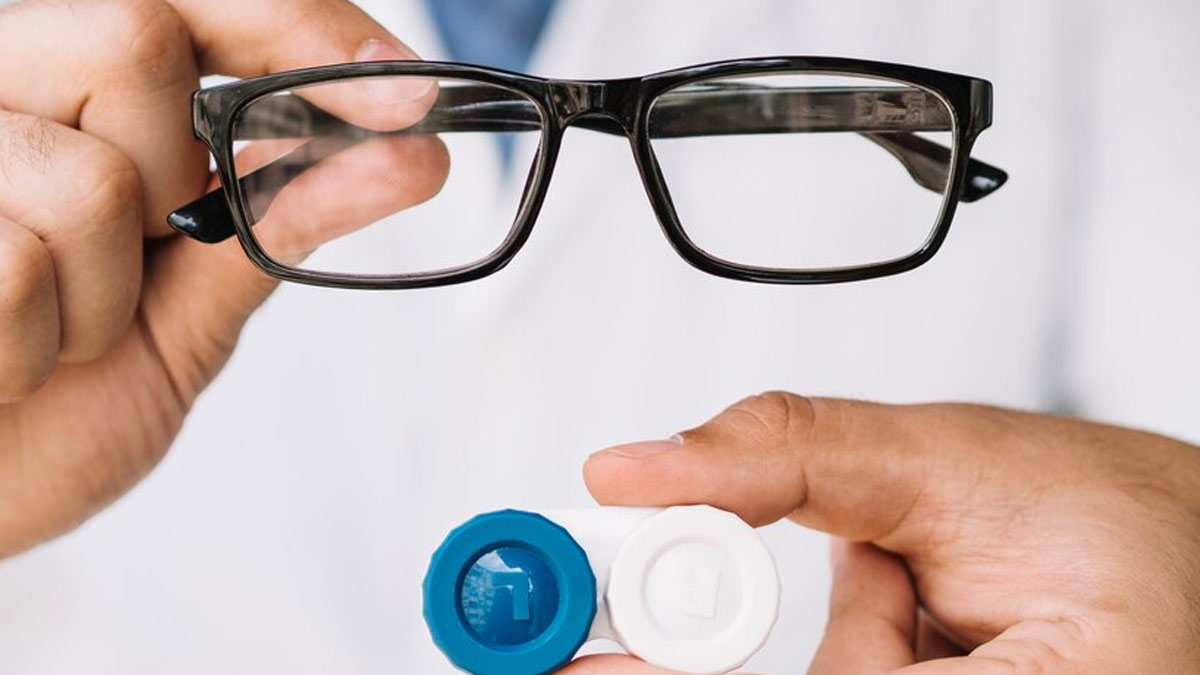
Your eyes require the same amount of care and support as your heart, lungs, or liver. As you age, it becomes even more important to protect your eyes from various diseases and decreased eyesight in general. Exposing your eyes to screens for a long time can also affect the quality of your vision in the long run, which is why you may require external support, like eyeglasses or contact lenses, to see better.
Table of Content:-
For decades, glasses have been the preferred eyewear for people with poor eyesight. However, lenses have gained popularity in recent years, especially among young people. But keeping the style factor aside, many wonder whether glasses are better than contacts or if it is the other way around.
Also Read: What Happens When You're Supposed To Wear Eye Glasses But Don't
In an interaction with the OnlyMyHealth team, Dr Kajal Kataria, Cataract and Refractive Surgeon, Dr. Sachdev Maxivision Eye Hospital, Surat, says that both glasses and contact lenses are effective in correcting vision in weak eyes, such as those with myopia. However, while glasses offer convenience, easy maintenance, and protection against eye irritation, contact lenses provide a wider field of vision and can be more aesthetically pleasing, especially for those concerned about appearance.
So which one should you pick between the two? Is there a right answer to this? Let’s find out...
Pros And Cons Of Eyeglasses

According to Dr Kataria, eyeglasses offer several advantages and disadvantages. These include:
Pros:
- Straightforward maintenance
- Easy removal when not needed
- Protection from environmental elements
- Can come in various styles and can be a fashion statement.
- Provides a barrier against airborne particles
- Reduces the risk of eye irritation and infection
Cons:
- Likely to fog up in certain conditions
- Hinders peripheral vision
- Cumbersome during physical activities
- Some people feel discomfort from the weight or pressure of glasses on their nose or ears.
- Regular cleaning is required to maintain clarity.
- Adjustments may be needed for optimal comfort and vision correction.
Pros And Cons Of Contact Lenses

Just like eyeglasses, contact lenses also have their own set of pros and cons. These include:
Pros:
- Provides a wider field of vision compared to glasses.
- Enables clearer peripheral vision
- Less affected by weather conditions like fogging or rain.
- No interference with activities like sports or outdoor pursuits
- Aesthetic benefits, as they don't alter facial appearance
Cons:
- Requires strict hygiene practices to prevent eye infections and discomfort.
- Challenging to insert and remove
- Eye dryness or irritation, particularly in environments with low humidity
- Requires regular check-ups with an eye care professional to monitor eye health and ensure proper fit.
Also Read: What Are The Dos And Don'ts While Wearing Contact Lenses, Explains Expert
Glasses Or Contact Lenses: The Verdict?

Both glasses and contact lenses have various pros and cons. As long as they help improve eyesight and do not cause any eye discomfort, both can be used depending on individual preferences, lifestyle, comfort, and the recommendation of an eye care professional, says Dr Kataria.
However, people without refractive errors or vision correction needs should not use prescription eyeglasses or contact lenses, warns the doctor, adding that doing so could strain the eyes and potentially lead to headaches or other discomfort.
On the contrary, non-prescription glasses or cosmetic contact lenses can be used for fashion purposes or to protect the eyes from environmental elements like dust or bright sunlight.
“It's essential to consult with an eye care professional before using any eyewear, even if it has no prescription, to ensure proper fit and suitability for individual eye health,” Dr Kataria concludes.
Also watch this video
How we keep this article up to date:
We work with experts and keep a close eye on the latest in health and wellness. Whenever there is a new research or helpful information, we update our articles with accurate and useful advice.
Current Version